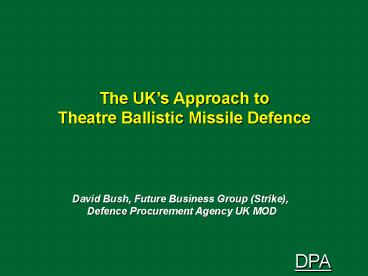FUTURE BUSINESS GROUP - PowerPoint PPT Presentation
1 / 27
Title:
FUTURE BUSINESS GROUP
Description:
David Bush, Future Business Group (Strike), Defence Procurement Agency UK MOD. DPA ... Full range of SAG scenarios in which there is a BM threat. Provide ... – PowerPoint PPT presentation
Number of Views:92
Avg rating:3.0/5.0
Title: FUTURE BUSINESS GROUP
1
The UKs Approach to Theatre Ballistic Missile
Defence
David Bush, Future Business Group (Strike),
Defence Procurement Agency UK MOD
2
Outline of Presentation
- UKs historical approach to TBMD
- Current UK policy to TBM and strategic BMD
- UK studies
- Potential outcomes
- Summary
3
History
Use of V2 against London 1944-5
4
Policy Background
- Continue to monitor the threat.
- Premature to decide on acquisition.
- Keep future options open.
- Gain better understanding of defensive
technologies. - Continue to work with allies
5
UK Programmes
- Pre-Feasibility Study 1995-6
- Balance of Investment Study 1996
- Policy review 1997
- Intercept study 1997-8
- Technology Readiness and Risk Reduction Programme
(TRRAP) 1998-2001 - Applied Research Studies 2001-2002
- Assessment of possible acquisition options
2002-2006
6
(No Transcript)
7
TRRAP Purpose
- Monitor developments in both potential threats
and responses - Establish a position from which an active BMD
system could be developed if necessary - Sustain expertise in UK industry and DERA
- Establish intelligent customer status
- Maintain links with US
8
TRRAP Purpose
9
UKs APPROACH TO BMD
- Directorate of Equipment Capability (Theatre
Airspace) - Applied research to support decision
making on way ahead for TBMD. - Directorate of Strategic Technologies (Ballistic
Missile Defence) - Strategic issues advice to
policy staffs on ST research.
10
DEC(TA) Responsibilities
- Control and denial of theatre airspace
- Concerned with the following classes of threats
- Fixed and rotary wing aircraft
- Uninhabited Air Vehicles (UAVs)
- Stand-off missiles
- Cruise missiles
- Theatre Ballistic Missiles
11
STUDIES
- NATO Feasibility Study into active TBMD (Reports
end 2002). - Applied research programme studies (report end
2002). - Assessment of possible acquisition options
(initial report 2004, final report 2006)
12
Capability Analysis
- Assess significance of the capability gap
- The type, scale and size of the threat,
likelihood of use etc. - Identify full range of potential options.
- Examine costs, benefits and balance of
investment. - Inform decision making on UK policy and equipment
planning.
13
TBM Threat assessment
- Four time points now, 2010, 2020, 2030
- Deployed forces, host nation, coalitions
- Full range of SAG scenarios in which there is a
BM threat - Provide baseline
14
Concept Studies
- Total System - deterrence, active, passive,
counterforce, battlefield management BMC4I - Allied capabilities
- Whole life costs, operational aspects, etc.
- EIAD
15
Research Studies
- Have addressed the areas of
- Biological decayInteroperability of employed
architecturesEffectiveness of WMD treaties and
export controlsEffectiveness of hit to kill
intercepts..
16
Capability Working Group
NATO Feasibility study
ACCS Air Command Control Systems
DEC(TA) DEC Theatre Airspace
CBW Pol Chemical Biological Warfare Policy
DEC (CCII) DEC Command Control Information
Infrastructure
CWG Capability Working Group
DST Directorate of Strategic Technologies (BMD)
DEC (ISTAR) DEC Intelligence, Surveillance,
Target Acquisition and Reconnaissance
DEC (NBC) DEC Nuclear, Biological and Chemical
DEC(AWB) DEC Above Water Battlespace
OTHERS
17
Methods
- Scenario planning
- Modelling
- Rules of engagement
- Real world scenarios
- Current and future equipment procurement plans
18
Measure of Effectiveness
- Traditional measures such as military
casualties unlikely to provide the full story. - Many socio-political aspects.
- Actually, not grossly different from many other
equipments in this respect.
19
Potential Outcomes
- Equipment capability options, individually or in
combination - Rely on current equipment and allies.
- Passive protection needed.
- Good early warning, ISTAR and BMC3I required.
- Any counter-force capability needs to be
effective. - Active TBMD system(s) might be required.
20
Rely on current equipment and Allies
- Nations have limited capabilities
- Could we develop European system?
- Encourage UK/European industry to contribute to
US development programmes - Could they protect our forces?
- Would they agree to protect our forces?
21
Passive Protection
- Is better NBC protection achievable for our
forces? - What about local civilian from the host nation?
- Gulf war experience
22
Good Early Warning, ISTAR and BMC3I
- Sensors to detect BM assets
- Intelligence
- Quantify the threat
- What is available
- Where it is
- Is being prepared to be used against us?
- Look for opportunities to disrupt/destroy
23
Active Counterforce
- Needs to be early into theatre
- Able to neutralise the threat.
24
Active TBMD Systems
- Deployable flexible system
- How many layers?
- How many assets
- Sensors
- BMC3I
- Launchers
25
Summary 1
- The UK continues to seek more information and
knowledge on BM defence. - When decisions have to be taken, the UK will be
in the best position to ensure they are fully
informed. - No decisions on BM defence have been taken yet.
26
Summary 2
- The threat from BMs and the need to counter them
is a sensitive and emotive issue - But can also be regarded as just another threat
to be countered with air defences. - Need to combine dispassionate research and
analysis of potential counters with wider
economic, political and military factors. - Financial technological constraints - will need
to work closely with NATO Allies to identify and
find solutions.
27
Questions?































